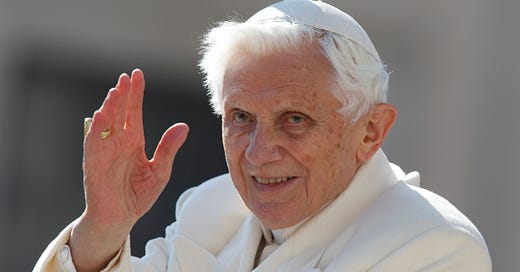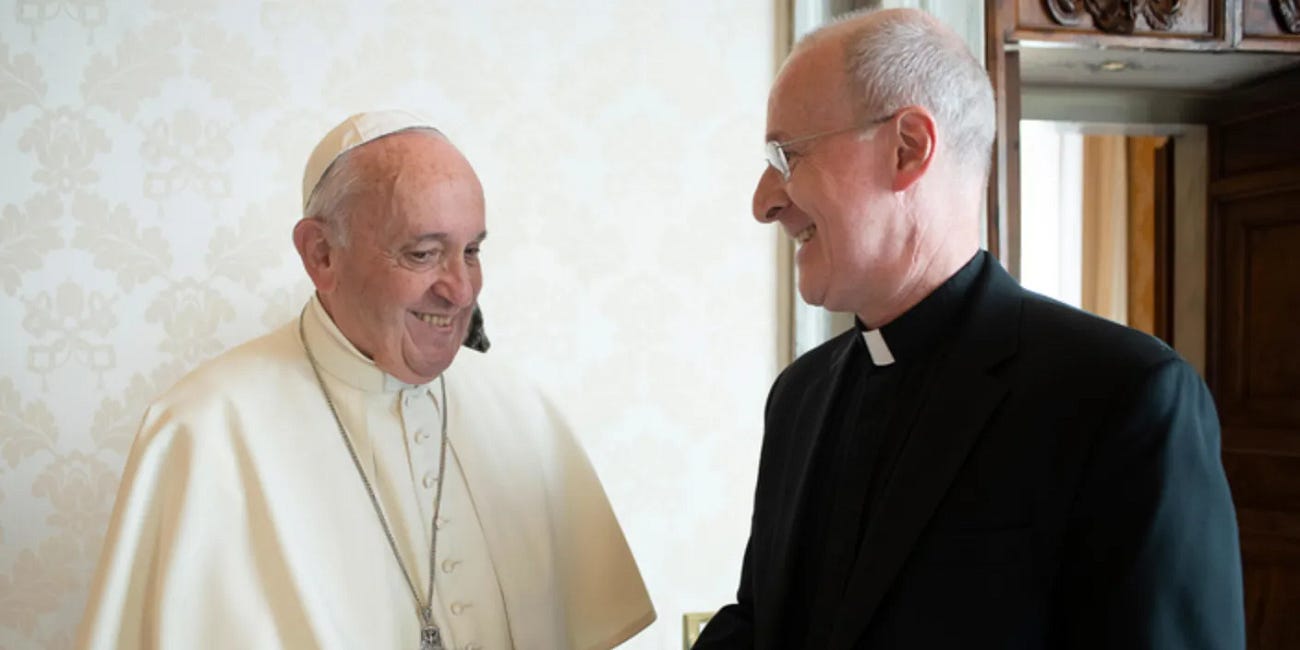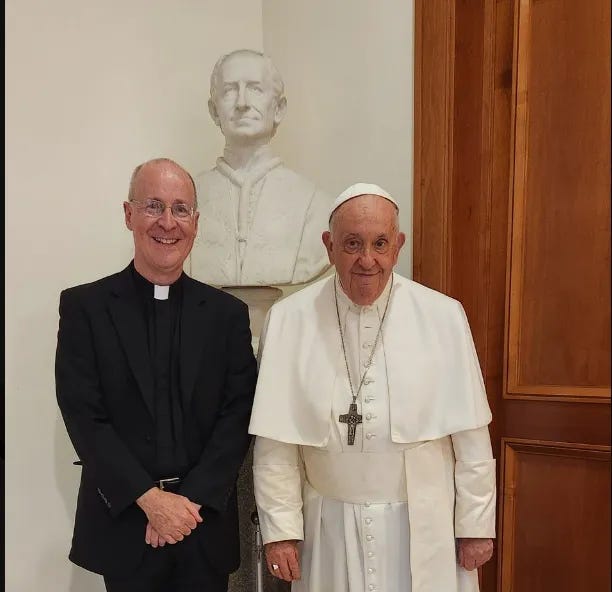Has it really been over three weeks since I wrote that we are probably in the Great Apostasy and that it will probably get worse?
“The Apostasy Comes First”
I am supposedly preparing to write a book on practical aspects of the End of the World, on how we should respond to the fact that, as the old bumper sticker said, “Jesus is coming and boy is he ticked.” (I think a less polite word was used, but anyway...) The End will not wait for me to complete my book, and Jesus might not either, so I might as well ge…
And I did promise to follow that up with something encouraging, didn’t I. Instead I wrote about MOAR apostasy . . .
Pope Francis’ "Pastoral" Fig Leaf for Apostasy
I was getting around to writing that we should be encouraged in the midst of what may be the Great Apostasy — I really was — when Pope Francis once again did something else to prove me right about the ongoing apostasy of the Church of Rome. In his answers to dubia
. . . especially from the Bishop of Rome. Well, I don’t want Jesus returning to find I have not kept my promise. So I best get with it about why you should be encouraged about living in this time of apostasy, perhaps in the Great Apostasy.
Yes, I’m serious. There are reasons to be encouraged.
First, God has chosen you to live during this difficult time. I forget who all said it — Tolkien or C. S. Lewis or a church father or two — but it is a glorious thing to be called to be faithful when faithfulness is unfashionable, rejected or even opposed.
What saints do we most revere? Athanasius standing “against the world” that seemed to be taken over by Arianism. Bonhoeffer standing against the “German Church” and its collaboration with the Nazis. Solzhenitsyn so refusing to be silent even after the gulag that the Soviets gave up and exiled him. Any number of saints who paid the ultimate price of martyrdom to remain faithful. It is a glorious thing to suffer for faithfulness, including the suffering of standing almost alone when it seems very few will stand with you.
Note I said almost alone. If we are faithful, we can say with Jesus:
Yet I am not alone, because the Father is with me. (John 16:32)
And Christ and the Holy Spirit will be with us as well. And, as the Lord informed Elijah, those who remain faithful under persecution and apostasy might be more numerous than we know. (1 Kings 19:14, 18)
There may be a second, rather counterintuitive reason to be encouraged. Some of my readers, especially Anglicans, may find that their small parish church just can’t seem to grow much. Sure, every few months, new people join, but they replace those who move on to another city or to eternity. To have a congregation of even 100 may seem a pipe dream you once had but have given up on. If you pastor such a church, you may in your heart even consider yourself something of a failure.
To such I say, if you are faithful, do not be discouraged. And don’t be too quick to blame yourself. St. Paul wrote to Timothy:
For the time will come when they will not endure sound doctrine; but after their own lusts shall they heap to themselves teachers, having itching ears; And they shall turn away their ears from the truth, and shall be turned unto fables. (2 Timothy 4:3-4)
Paul might have been writing of the time of the Great Apostasy. What are the big churches with people flocking in? Mostly Churches of What’s Happening Now with sloppy feel-good self-help theology preached, if such can be called theology, and perhaps also sugary over-amplified “praise and worship,” if such can be called worship. And how many of those over-sized, over-amplified churches have happy-clapped and slip-slopped into apostasy in recent years?
Meanwhile through the years platformed leaders of these large churches have pushed “church growth” and “seeker sensitive” and “purpose driven” models of doing church. I’m old enough to remember when these worked for a time, to increase numbers and budgets. But they resulted in congregations and a Christianity a mile wide and an inch deep, with predictable results we are now seeing. These models and their fleeting success also pushed false feelings of guilt and failure on faithful pastors of small churches. Why is your church so small?
Yet these models have only accelerated apostasy in many cases. In the West, large faithful churches are getting fewer and fewer. (Note that I am speaking mainly of the West. I thank God that the faithful church in Africa, for example, has grown greatly and remains numerous.)
I think a typical faithful church in the U. S. is becoming — and often already is — a congregation of 40-200 with a committed core. Some traditions may be able to attract more. Here in Texas, Baptists and non-denoms usually attract more than Anglicans.
So if your church is small but committed and true to “the faith once delivered unto the saints,” be encouraged! During such a time as this, you are probably doing church about right.
And should persecution increase in the West, it may be helpful to be small to remain under the radar of totalitarians. Larger churches unwilling to bow the knee to secular ideologies are larger targets for tyrants. (Yes, the Roman Catholic Church was a bulwark of opposition to Communism in Poland. But no church today in the West has the influence of the RCC in 20th century Poland.)
But most of the faithful may have little choice about it, may have to make do with being small. Yes, we can and should evangelize and invite and teach with all the power and wisdom God gives us. And no telling how God may use that. But if Jesus asked, “When the Son of man cometh, shall he find faith on the earth?” (Luke 18:8) we should not presume our efforts will result in a large congregation during a time of apostasy. Jesus indicated the faithful will be few on the earth. In the West, they are already getting fewer. So we should not expect otherwise even as we strive to invite people to flee prevailing falsehoods for the Faith.
Pope Benedict expected the church to get smaller:
The church will become small and will have to start afresh more or less from the beginning. She will no longer be able to inhabit many of the edifices she built in prosperity. As the number of her adherents diminishes . . . she will lose many of her social privileges. . . . It will be hard-going for the Church.
I know all this may sound pessimistic, but it is realistic. If Jesus asked “shall he find faith on the earth” when he returns, then one should not expect much faith on the earth when he returns.
Yes, his church shall triumph. Remember the Great Apostasy is followed by the return of Christ to set up his Kingdom in which “they shall reign forever and ever.” (Rev. 22:5) But I think the church will overwhelmingly be the church triumphant in that day, not the church militant.
So if the fruit of your faithfulness is a small congregation committed to Christ and His Truth even in the midst of the current apostasy, you be encouraged, not discouraged. I’m confident Jesus will say to those few who remain faithful in the Great Apostasy, “Well done, good and faithful servants.” (Matthew 25:23)





My good friend Father Clay Hunt has said much the same. The faithful should rejoice, to be alive in times like these.
I've been perusing the list of congregations that have voted in favor of disaffiliation in the North Georgia Conference of the UMC. By and large, it is small congregations that have opted to leave. A handful of large congregations have voted to leave as well, but these are not anywhere near being in the majority.